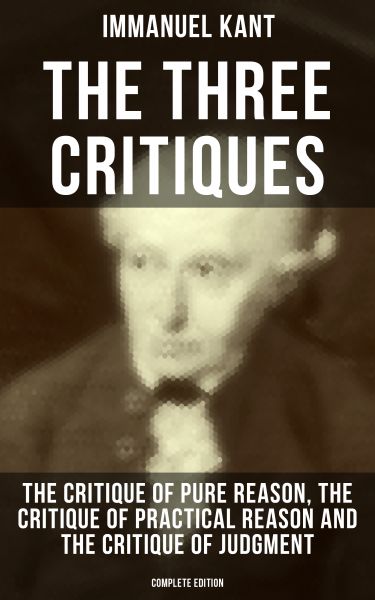The Three Critiques: The Critique of Pure Reason, The Critique of Practical Reason and The Critique
The Base Plan for Transcendental Philosophy, The Theory of Moral Reasoning and The Critiques of Aesthetic and Teleological Judgment
The Critique of Pure Reason is one of the most influential works in the history of philosophy. Kant here explains what he means by a critique of pure reason: "I do not mean by this a critique of books and systems, but of the faculty of reason in general, in respect of all knowledge after which it may strive independently of all experience." The Critique of Practical Reason is the second of Immanuel Kant's three critiques and it deals with his moral philosophy. The second Critique exercised a decisive influence over the subsequent development of the field of ethics and moral philosophy, beginning with Johann Gottlieb Fichte's Doctrine of Science. The Critique of Judgment, also translated as the Critique of the Power of Judgment completes the Critical project begun in the Critique of Pure Reason. The book is divided into two main sections: the Critique of Aesthetic Judgment and the Critique of Teleological Judgment, and also includes a large overview of the entirety of Kant's Critical system, arranged in its final form.
Immanuel Kant (1724-1804) was a German philosopher, who, according to the Stanford Encyclopedia of Philosophy is "the central figure of modern philosophy." Kant argued that fundamental concepts of the human mind structure human experience, that reason is the source of morality, that aesthetics arises from a faculty of disinterested judgment, that space and time are forms of our understanding, and that the world as it is "in-itself" is unknowable.
Versandkostenfreie Lieferung! (eBook-Download)
Als Sofort-Download verfügbar
- Artikel-Nr.: SW9788027235599
- Artikelnummer SW9788027235599
-
Autor
Immanuel Kant
- Mit J. M. D. Meiklejohn, T. K. Abbot, J. H. Bernard
- Wasserzeichen ja
- Verlag Musaicum Books
- Seitenzahl 1050
- Veröffentlichung 06.12.2017
- ISBN 9788027235599
- Mit J. M. D. Meiklejohn, T. K. Abbot, J. H. Bernard

